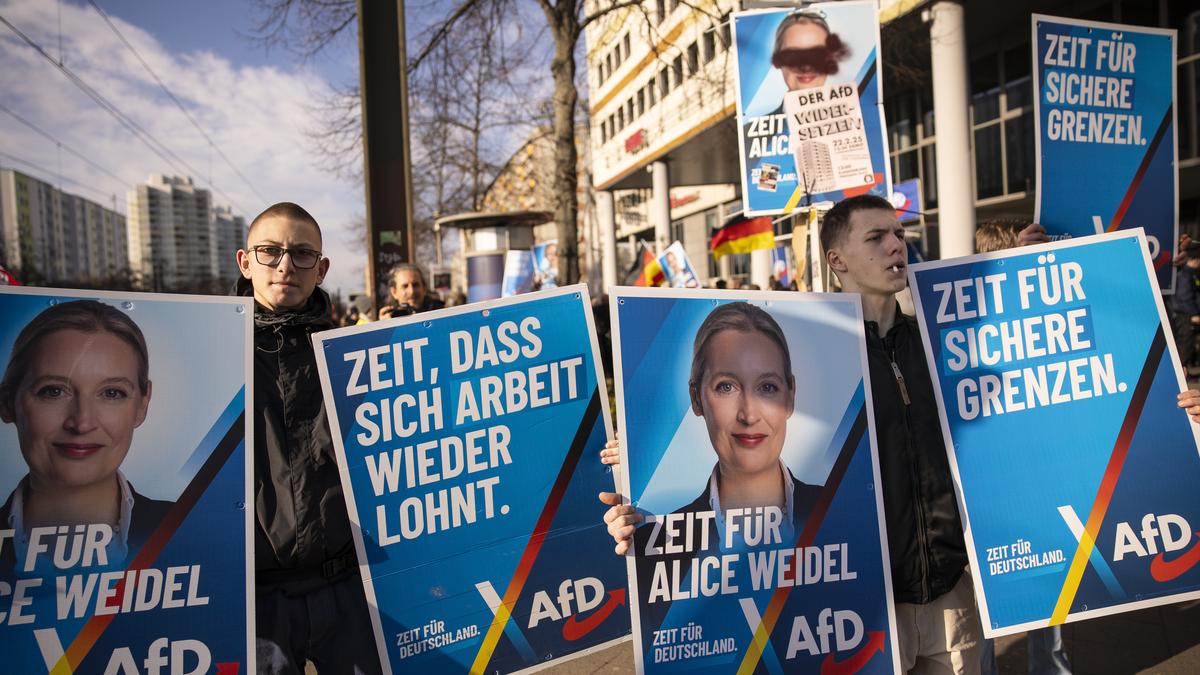
The worrying surge of the AfD Premium
The Hindu
Given the global trend of a political shift towards the right, the rise of the AfD isn’t particularly surprising. Nevertheless, it is a matter of concern
On the first day of the 61st Munich Security Conference, the U.S. Vice-President, J.D. Vance, lambasted European leaders, accusing them of censoring free speech and criticising German mainstream parties for their “firewall” against the far-right Alternative for Germany (AfD). Mr. Vance was pilloried for “interfering in Germany’s affairs”. But it was clear that he had hit a nerve for another reason too. The AfD is trending at around 20% in the pre-election polls, which has made the two mainstream parties — the Christian Democratic Union (CDU) and the Social Democratic Party (SPD) — jittery.
The focus of the election campaign, in the light of recent attacks by two young refugees from Afghanistan and Syria on civilians in Aschaffenburg and Munich, respectively, has quickly moved to migration. The German economy is stagnant. The security and peace that Germany and Europe had come to cherish after the fall of the Wall is fragile. These issues are driving the election campaign, and the AfD believes it has an answer to each of them.
While the cries for stricter rules for migration and curbing illegal migration have become stronger over the past few years, political sentiment has rarely been so anti-migrant. During the 2015 “refugee crisis”, it was clear the bureaucratic apparatus of the German state was overwhelmed. As there was no solid, long-term plan for controlling irregular migration, debates around the legality of the Right to Asylum, and the measures to quickly integrate and assimilate refugees to help them start life afresh, gained momentum. The AfD argued that the migrants were becoming a burden on the state. Cognisant of the fact that no mainstream media wanted to engage with them, the AfD began engaging with people on social media and regularly churned out hate speech. In a country that was sensitive about how it frames any political conversation around migrants, refugees, and so-called ‘Others’, given its history, the AfD began normalising extreme views.
In the aftermath of the attack in Aschaffenburg, the current chancellor candidate of the CDU, Friedrich Merz, drew attention when he broke the “firewall” by bringing in a motion in the Bundestag on stricter immigration policies, the legality of which has been debated extensively. The motion was passed with the support of the AfD; the Bill, however, didn’t go through. This daring move also exposed the split within the CDU, with former Chancellor Angela Merkel criticising Mr. Merz for turning his back on a previous pledge not to work with AfD in the Bundestag. Such incidents are forcing the so-called mainstream parties like the CDU to not only take a nationalist stance on border and migration issues to prove that they are doing something about the issue, but to also work with the AfD.
The German economy hasn’t made matters easier for the current Chancellor, Olaf Scholz, who is looking to return to power. With the global economic slowdown, Germany’s economy has been contracting — in 2024, it shrunk by 0.2%. The Russian invasion of Ukraine and the prolonged war have pushed up the electricity prices — compared to 2019, the price of electricity grew by 111% in 2022, leading to a drop of 20% in production in energy-intensive sectors in 2023. Inflation peaked at 8.67% in 2022 and has stabilised at 2.41% in 2024. Key areas such as the automobile sector are struggling to keep up with China, especially on the innovation front, and facing a drop in exports. The German economy is also quite stressed about the potential impacts of a new tariff regime leading to an increase of as high as 25% in key sectors, the ripple effects of an impending trade war between China and the U.S., and the churning of the world order under the new Trump administration.
The third challenge driving the conversation during elections in Germany is the Russian war in Ukraine. If U.S. President Donald Trump plans to strike a deal with Russian President Vladimir Putin to end the war in Ukraine. This has led to concern in both Ukraine and Europe, especially since U.S. Defence Secretary Pete Hegseth has said that Ukraine’s membership in the North Atlantic Treaty Organization (NATO) is “unrealistic”. Also, the possible deal will result in an emboldened Russia, leaving Europeans scrambling for defence. This would mean that NATO members would have to commit to an increase in defence spending.
For Germany, this would involve renegotiating the constitutionally enshrined debt brake under which the federal government is required to limit annual borrowing to 0.35% of GDP with exceptions during natural disasters or economic crises. The necessary increase from 2% to 3.6% of its GDP to meet the increased target capability for NATO members plus an increased expenditure to invest in capacity building for resistance to hybrid warfare that Russia is so adept at will take its toll on the German economy. Germany and Europe will have to reimagine their entire security architecture. Most of the mainstream parties have varied ideas about how they want to meet these challenges, but they agree that Ukraine requires support and Russia poses a danger.













